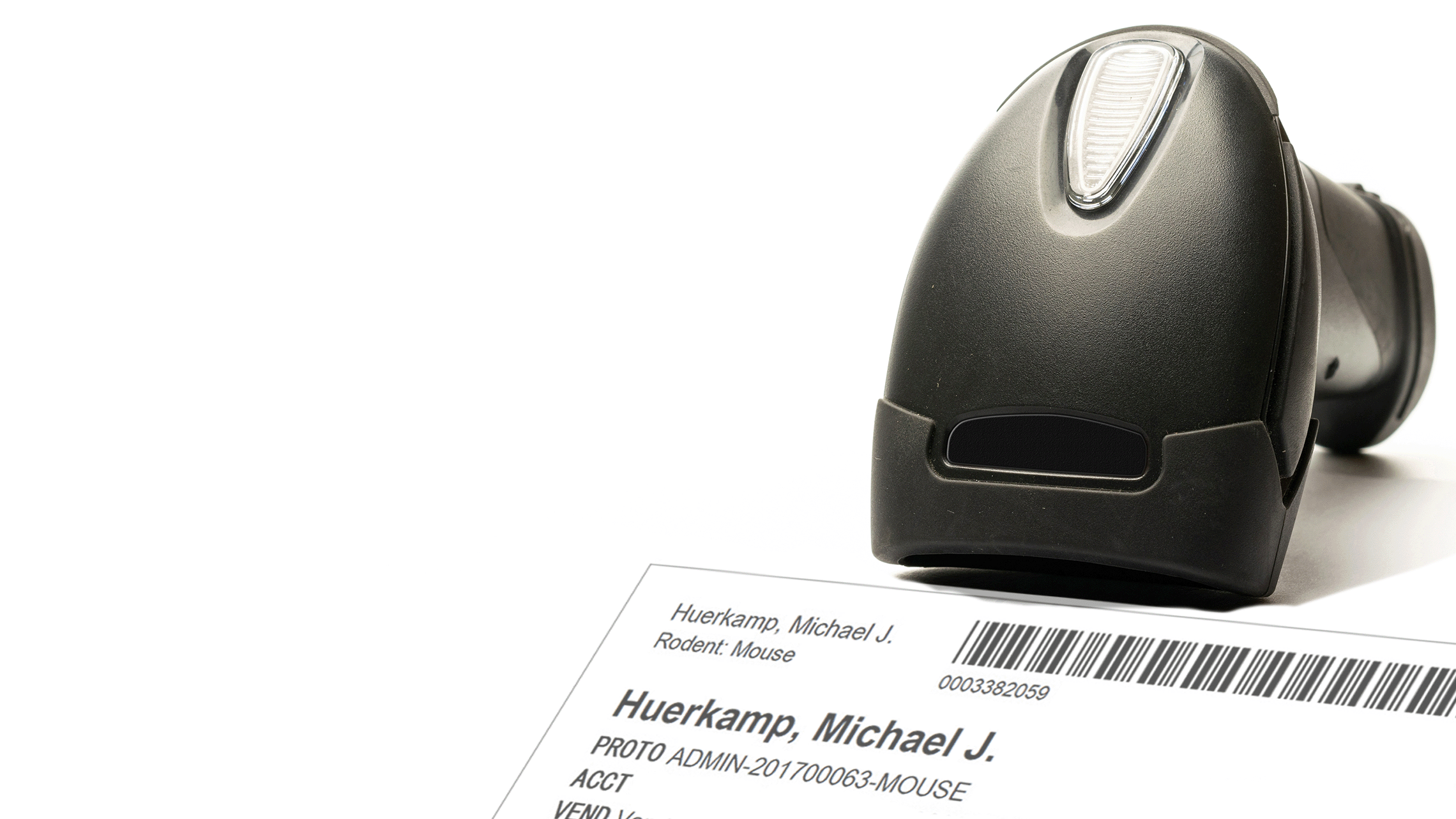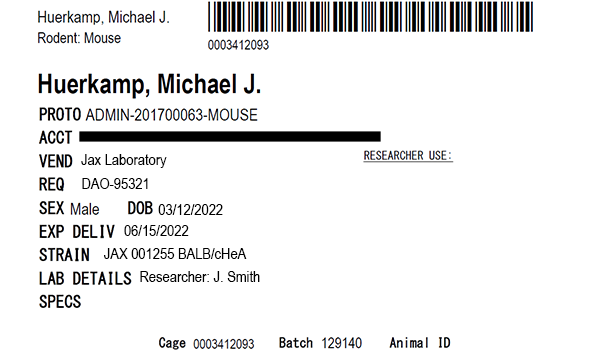
Census Procedures
In addition to Animal Care services and Veterinary Care, DAR also offers significant administrative support to researchers housing animals in our facilities. From twice weekly full facility census operations to cage card production and maintenance, there are a variety of services DAR provides to help researchers track and maintain their populations.
Facility Census
Collecting census information on a frequent and regular basis is a necessary function of any animal care facility. Every cage in each of DAR's animal facilities must have a cage card attached per The Guide for the Care and Use of Laboratory Animals. At DAR, each cage card features a bar code that identifies that cage's unique identifier (also known as Cage Card # or CCID). The census numbers reflect the amount of animal care necessary to maintain the animal population and, for that reason, is essentially the basis for per diem charges to investigators. In addition, it provides a record of the total population of the facilities on any given day as well as a record of how long any cage was housed and managed by DAR.
Cage cards of animals on census are scanned on Mondays and Thursdays. Cage cards are also scanned for newly-arrived animals on the date of their arrival, for weaned animals on the date of weaning, and on the date when any animal is transferred by DAR between animal research facilities. Cages that are not present in an animal research facility during the census scan (e.g., when in a laboratory) remain on the census until four scans are missed.
Scanning is permanently halted and accounting on the census ceases when cage cards from depopulated enclosures are given to the facility supervisor for scan-out.
Cage Card Creation and Requirement
Cages must be properly identified with the Protocol and Segment, Smartkey and PI along with the barcoded cagecard number. Animals ordered through our Customer Service office with standard vendors or that comes in through our quarantine service will be assigned cagecards by DAR personnel. Cards for animals that are needed for increased number of cages due to breeding activity or separation to meet the needs of the research (or of the animals) may be ordered with the Vendor choice of EU: Weaning or EU: Separation. If weaning animals, the animals need to be deducted as usage from your protocol segment. Using EU: Weaning will allow this deduction to occur through our semi-weekly cagecard scanning process. Please note that the segment and the smartkey must align per your protocol segment approval if the smartkey represents sponsored funding. EU: Separation will allow you to separate animals already reported to your protocol segment without incurring further usage deduction.
To request Weaning and/or Separation cards: http://www.dar.emory.edu/employees/apps.php

Termination of the Cage Card
Termination of Cage Cards allows DAR to stop census on that card. In order to stop per diem charges (effective the day after termination), please make sure that you drop your card into the designated file pocket located in the animal facility (typically located outside of the animal facility supervisor's office). The cards are collected daily and dated for scan out with that day's date. Please speak to the facility supervisor if you would like to retrieve your cards.
Implications of Expired Cage Cards
Cage cards are an important source of information specific to each animal enclosure including identifying the responsible investigator, genotype, source, and signalment information for the animals, the smartkey number supporting the work, and regulatory data. The use of cage cards nationwide in animal research facilities represents a best practice as an aide to animal identification, a means of animal tracking and census tabulation, and as a link to conditions of IACUC approval including pertinent dates, allowable animal use, and all other protocol-related specifics.
Cages cards enter a state of expiration by definition when a protocol is not renewed by its 3-year anniversary or when it is renewed and new cage cards, with the new protocol number, are not used to replace the previous version rendered obsolete by renewal.
- When a protocol is not renewed at its 3 year anniversary, the IACUC is not permitted to administratively extend the approval period, continuation of animal research activities is prohibited, and the animals are transferred and reside on the DAR animal holding protocol until the situation is resolved. Although the associated department and, under special conditions, the grant may continue to be billed for animal-related charges , the full census affiliated with the expired protocol and their disposition in effect become the property of the DAR Director until the situation is addressed and the protocol is renewed.
- When a protocol is renewed, but the cage cards are not updated with new replacements, a situation exists where there is the illusion of ongoing unapproved activity and, due to the presence of an obsolete IACUC approval number, ready access to accurate and contemporary protocol-related information by the research team, veterinary staff, IACUC, and external funding and regulatory authorities is impaired. Considering this situation from a research perspective, it is easy to arrive at the conclusion that replacing animal cage cards at the time of protocol renewal should be a DAR matter and not seen as very relevant to the conduct of high quality science. Beyond the link to IACUC-related information, cage cards, however, are often used by research personnel to maintain experimental records and, at the time of protocol renewal and cage card transition, research personnel who are commonly in the animal research facilities are the best-suited to safeguard and properly steward these often important "research documents". Considering the case of mice alone and with hundreds of laboratories and different protocols; tens of thousands of individual mouse cages with cage cards; several hundred cages on census transitioning from old to renewed protocol status per month; innumerable grants and accounts; and countless persons possibly noting things on cage cards; the potential for the DAR to lose, destroy, ruin, obscure, misinterpret, or besmirch cage cards and important notations regarding signalment, pedigree, phenotype, experimental interventions, smart key number, and the like for any and all of those situations is enormous. With our desire to enable research to flourish because of the DAR and not despite us, the DAR cannot in good conscience be placed in a position to confound experiments in this way. Additionally, the animal per diem rates are not calculated to include and recoup costs borne by the DAR in replacing cage cards at the time of de novo (3-year) protocol renewal for investigators. Taking on this burden, beyond the likelihood of mistakes, will put upward pressure on the per diems. Lastly, animal research is a highly regulated enterprise with the regulations and the expense-generating activities imposed upon us most prominently by the NIH and its Office for Laboratory Animal Welfare. This includes correlating cage inhabitants accurately with the contemporary protocol number (via the cage card) so that the IACUC can be assured that animal usage is tracked and does not exceed the number approved. As such, the IACUC has directed the DAR that cage card replacement in concert with 3-year de novo protocol renewals is a lab/PI responsibility and not one of the DAR. Where this laboratory responsibility is neglected and upon instruction by the IACUC, the DAR will replace obsolete cage cards with contemporary ones, recharge for this service at the unscheduled technical assistance rate as listed in the current fee schedule, and with the proviso that the DAR will not be responsible for any loss, destruction or disfiguration of the obsolete, replaced cards.
The ideal solution to eliminate condition #2 (i.e. a protocol is renewed on time and is in a state of approval, but cage cards are not updated) would be to use immortal IACUC numbers. Unfortunately, the current Web P&R software version does not allow for this sensible approach. Be assured that the IACUC administration and faculty leadership of the IACUC are aware of this need and will address it when the technology becomes available. Until then and as always, your DAR needs and appreciates your patience, support and cooperation.
Investigator Listservs
DAR uses the PI listserv to communicate about mortality reports, overcrowded notices and sick cases. The researchers should maintain the listserv with the contacts who should receive these notifications. Instructions can be found in the related SOP.
Published: 12.14.2022